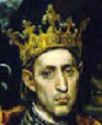



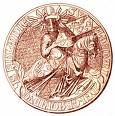



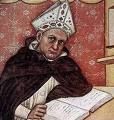



1250 Video killed the radio star? Millennium Fever is raging in the Franciscan Order among the followers of super-popular Joachim of Fiore (Joachim of Flora) (Gioacchino da Fiore) (1135-1202), who predicted this year to be the dawn of the Age of the Holy Spirit; when it doesn't happen, they reset it to the year 1260 and keep asking for donations? About this time the Medieval Climate Optimum (begun 950) along with the optimal climate conditions in Europe since 1000 end, and the Little Ice Age (begins 1350?) (ends 1850) begins as Atlantic ice pack begins growing, bringing poor harvests, famine, and disease, and changing the sociopolitical landscape with a pop. reduction, uprooted vagabond farmers, and a blind rage against the rich and Jews; Europe begins to be rapidly deforested, leading to a shortage of wood for heating and cooking by 1500, along with a decline of wild game and a food shortage; luckily, in the 16th cent. potatoes and corn (maize) are brought in from the New World, and soft coal begins to be used as fuel. On Feb. 2 Eric XI the Lame (b. 1216) dies, and his son-in-law (son of Birger Jarl Magnusson and Ingeborg Eriksdotter) Valdemar I Birgersson (1239-1302) becomes king of Sweden (until 1275), founding the Folkung (Bjelbo) Dynasty (ends 1365); Swedish PM (since 1248) Birger Jarl, who was campaigning in Finland soon returns and regains his grip until his death in 1266. Black Egyptian Muslims kick white Christian butt in the days of hand-to-hand? In Feb. a Coptic Christian helps the Seventh Crusaders led by French king (1226-70) Louis IX find a ford across the Nile River, and on Feb. 8-11 they defeat the Egyptians under Al-Zahir al-Malik Baybars (Baibars) (Arab. "panther") (1223-77) at the Battle of Al Mansura (Mansurah) on the Nile River (30 mi. SW of Damietta) (founded about 1200), but on Apr. 6 they are totally defeated by Egyptian forces under new caliph (since Nov. 22, 1249) Al-Muazzam Turanshah (-1250) (older brother of Saladin) at the Battle of Fariskur; the Crusaders are routed, most of their 15K-man army is KIA, and Louis IX is captured and held for ransom (until 1252). In June the remains of Queen St. Margaret of Scotland (d. 1093), wife of Malcolm III are translated to Dunfermline and housed in a splendid shrine to mark her canonization by Pope Innocent V, and she becomes the first Scottish saint (until ?). On Aug. 9 Eric IV (b. 1216) is assassinated by his brother Abel of Denmark (1218-52), duke of Schleswig (since 1252), who on Nov. 1 becomes king of Denmark (until 1252), swearing along with 24 nobles that he didnt' do it, causing the saying "Abel by name, Cain by deeds". On Dec. 13 HRE (since Nov. 22 1220) Frederick II (b. 1194) dies in Castel Fiorentino, Sicily, leaving his legitimate son Conrad IV (1228-54) the throne of Germany (1237-54), Jerusalem (1228-54) and Sicily (as Conrad I) (1250-4); he makes his other crypto-legitimate son (did she or didn't she marry him first?) (he claims he is, and both have the same love of poetry and science?) Manfred of Sicily (1232-66) prince of Taranto and Conrad's rep in Italy; Pope Innocent IV continues his struggle against the Hohenstaufen succession, stirring up revolts in numerous cities, all of which Manfred is able to subdue except pesky Naples; meanwhile late Frederick II becomes "Gran Frederigo", the hero of S Italy, leaving the 589-page De Arte Venandi Cum Avibus (The Art of Hunting with Birds), describing bird anatomy, analyzing their flight and migrations, along with experiments with artificial incubation in his well-stocked menagerie, illustrating it with hundreds of accurate drawings; he also writes some of the first Italian Verse (which is born at his court?), and Latin translations of Aristotle, which are taken up by univ. students, launching a mini-Renaissance in Italy, even if he was German? The noble revolt in Bohemia (begun 1247) ends after Wenceslaus I invades to restore order. About this time the MacDonald Clan begins ruling the Hebrides (until 1700). About this time the O'Neill clan in N Ireland begins a major rebellion against the stankin' English, which spreads to Munster, burning English colonists' homes and ransacking their lands until it fizzles by 1261, leaving most of Ireland except the N, midlands, and parts of the W coast ruled by Anglo-French lords. Norway enacts the death penalty for homosexuals, ditto Castile - it's norway or the highway? A commercial-industrial boom begins in N and C Italian cities. In this half-cent. Longbows become dominant in English warfare (until 1450); range can reach up to 300 yards, and at 100 yards or less they are sure killers. Hats come into fashion in Europe. Goose quills are first used for writing in Europe. The Early Gothic Period (begun 1175) ends, and the High Gothic Period in architecture begins in Chartres, France (ends 1500). By this year the Franciscans have established 50 houses in England, and the Dominicans are not far behind; friars dominate European intellectual thought for the rest of the cent. Italian brain man (St.) Thomas Aquinas (1225-74) is ordained a priest, teaching at the U. of Paris starting in 1252. Four nat. colleges are established at Paris U. German HRE (1220-50) Frederick II confers brewing pivileges on the citizens of Regensburg (Ratisbon) in SE Germany; too bad, after a poor barley harvest in 1433 the authorities permit imported beers from as far away as Hamburg and Dortmund; in 1447 they appoint city physician Konrad Megenwart as their first official beer inspector; in 1453 they forbid "seeds, spice, or rushes" in beer, along with thin beers made from the final runnings of the mash. Architecture: Notre Dame Cathedral in Paris, France (begun in 1163) is finished. St. Thomas Church in Leipzig is begun (finished c. 1500). The Jaina Temple on Mount Abu is built. The Johannes Church in Thorn (Torun) in NW India is built. Synagogues are built in Toledo and Worms. Inventions: The Portatio (Portative Organ), a small portable organ is developed. Roger Bacon (1214-94) of England invents the convex Magnifying Glass (hand lens). Science: In this half-cent. French Franciscan friar Bernard of Verdun writes Treatise on the Whole of Astronomy (Tractatus Super Totam Astrologiam), defending Ptolemy's theory of epicycles and eccentrics against al-Bitruji's system of homocentric spheres. About this year Jewish physician (in Jerusalem) Benevenutus Grassus Hierosolimitanus (-1290) pub. Practica Oculorum, which becomes a hit in the Muslim and Christian worlds, becoming the first work on opthalmology printed with the printing press in 1474. German Dominican friar Albertus Magnus (1193-1280) of Cologne (teacher of Thomas Aquinas) discovers the element Arsenic (As) (Gr. "yellow orpiment") (#33). About this time Persian Muslim mathematician Nasir ud-Din al-Tusi (1201-74) of Tus, Khorasan pub. the first treatise treating trigonometry as its own subject rather than a part of astronomy; it takes the Euros two cents. until Regiomontanus (1436-76) to equal it. Nonfiction: Anon., Black Book of Carmarthen; written in Wales, becoming the oldest Welsh ms. to survive to modern times. Vincent of Beauvais (1190-1264), Speculum Maius (Majus) Naturale, Historiale, Doctrinale; encyclopedia of medieval stupidity by a French Dominican friar, quoting 450 Greek, Latin, and Arabic writers, becoming the #1 encyclopedia of the Middle Ages; the 40-vol. original is divided into "Speculum Naturale", "Speculum Doctrinale", and "Speculum Historiale", with "Speculum Morale" added around 1310; "I do not know even a single science." Henry de Bracton (-1268), De Legibus et Consuetudinibus Angliae (5 vols.) (1250-6); first systematic digest of English law. Jordanus Rufus, De Medicina Equorum (Of Horse Medicine); veterinary manual. Music: About this time the Gregorian chant Dies Irae (Lat. "Day of Wrath") is written by Thomas of Celano (1200-55) (a disciple of St. Francis of Assisi), and is sung in the Requiem Mass. Plays: The Easter Play of Muri is first performed, becoming the beginning of German drama. Poetry: Anon., Aucassin et Nicolette; a verse-prose "cantefable" love story set in Beaucaire in S France is written about this time. Anon., The Poem of Fernan Gonzalez (1250-71); exploits of the plucky first count of Castile (930-70). Dederic van Assenede, Floris and Blanchefleur; Muslim King Fenix of Al-Andalus ambushes Christian pilgrims on the Way of St. James, kills a French knight, and takes his widowed daughter to Naples, making her a lady-in-waiting to his wife, after which they give birth on Palm Sunday to Floris ("belonging to the flower") (to Fenix's wife) and Blanchefleur ("white flower") (to lady-in-waiting), who grow up and fall in love, which is prohibited by Fenix, who sells Blanchefleur to merchants from Cairo and lies to Floris that she died, but when he almost commits suicide daddy comes clean, and he heads for Cairo, where he wins her by playing chess, after which they come back and convert their kingdom to Christianity, woo woo. Poetry: Wernher der Gartenaere, Meier Helmbrecht; a 1,934-line satirical poem; the first German peasant romance, about a farmer's son who decides he's noble and dresses the part, then forms a 10-man gang and terrorizes the countryside, returning home to talk his sister Gotelind into marrying one of his gang, but at the wedding feast the law catches up with them, hanging his gang and mutilating and blinding him, after which he is hanged by the peasants after his daddy won't accept the Prodigal Son. Yukinaga Shinanozenji, Heiki (epic). Births: Greek emperor of Nicaea (1258-61) John IV Doukas Laskaris (Ducas Lascaris) (d. 1305) on Dec. 25; son of Theodore II Doukas Laskaris and Elena of Bulgaria. Russian grand duke of Vladimir-Suzdal (1276-81, 1283-93) Dmitry Alexandrovich of Pereslavl (d. 1294); 2nd son of Alexander Nevsky (1220-63). Muslim mathematician-astronomer Shams al-Din Muhammad ibn Ashraf al-Husayni al-Samarqandi (d. 1310) in Samarkand. Italian physician-philosopher-astrologer Pietro d'Abano (Peter of Abano) (Petrus de Apono or Aponensis) (d. 1315) *b. 1257)?) in Abano Terme. German minstrel-poet (Mastersinger) Heinrich Frauenlob von Meissen (d. 1318) (b. 1260?) in Meisen. Italian condottiero Uguccione della Faggiuola (d. 1319) in Casteldelci. Deaths: Italian mathematician Leonardo Fibonacci (b. 1170). French duke of Brittany (1213-21) Peter I (b. 1187) on May 26. German HRE (1220-50) Frederick II (b. 1194) on Dec. 13 in Castel Fiorentino, Puglia, Italy; for the next cent. rumors persist that he is still alive, living in a cave in Mt. Kyffhauser (Kyffhäuser) in Thuringia awaiting the summons of the German people to return and restore peace in the empire. Danish king (1241-50) Eric IV (b. 1216) on Aug. 9 (assassinated).
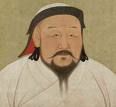


1251 On June 6 Margaret II's son William III of Dampierre (b. 1223) is assassinated at a tournament in Trazegnies by a group of knights financed by his half-brother John I of Avesnes (1218-57), causing his younger brother Guy of Dampierre (1226-1305) to take up his cause. On Dec. 25 Henry III knights Alexander III of Scotland, and on Dec. 26 he marries Henry III's daughter Margaret of England (1240-75) (sister of Edward I Longshanks); Alexander does homage for his English lands but not for Scotland itself; meanwhile Henry III suddenly demands the resignation of all of Alexander's royal officials present at the wedding, esp. Alan Durward, who was trying to get his bastard wife legitimized in Rome, which would make her and her daughters royal heirs, causing rumors that he was planning to kill the king and seize the throne; Walter Comyn and his Comyn (Cumming) Clan take over the govt. admin. for the next four decades, with his sons Alexander Comyn, 2nd Earl of Buchan (1217-89) and John II "Black" Comyn, Lord of Badenoch (-1302) (brother-in-law of John Balliol) running it at the end. Wenceslaus I's son Ottokar II, margrave of Moravia and husband of Frederick II the Quarrelsome's sister is elected duke of Austria by the Austrian estates after the death of the last Babenberg duke. Alexander Nevsky signs a peace treaty with Norway, then invades Finland and routs the pesky Swedes. Thousands of shepherds (pastoreaux) lead the popular Pastoureaux (Shepherds) Insurrection (Crusade) in N France allegedly to rescue Louis IX, intending to usher in the Parousia by slaughtering "heretics", i.e., Jews, Muslims, intellectuals, and the rich. Kublai (Khubilai) Khan (1214-94) becomes Mongol gov. of China; Hulagu (Hulegu) (Halagu) Khan (1217-65) begins conquering Persia (until 1265); Mongke (Möngke) (Mangu) Khan (1209-59), son of Genghis Khan's son Tului and a Nestorian woman (elder brother of Kublai Khan and Hulagu Khan) is elected Great Khan by the Mongolian diet (until 1259), going on to hold a series of court debates between Buddhists and Daoists (Taoists), with Confucians sitting in, and the Daoists losing - hosted by Alex Trebek? The Hanse of Utrecht is formed. Births: French Knights Templar leader Geoffroi de Charnay (d. 1314); deputy of Jacques de Molay (1244-1314).
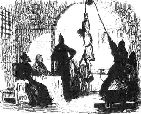


1252 On Apr. 30 St. Louis IX of France is released after paying a princely ransom of 500K pounds tournois (50K gold bezants - the entire annual revenue of France), moving his army to Jaffa to regroup, throwing a chess set overboard on his trip from Egypt, making John of Ibelin, count of Jaffa into a big man who corresponds with Henry III of England, and Pope Innocent IV; meanwhile Louis IX goes on a pilgrimage to Jerusalem (ends 1254) - it's nice to be a rich saint? Intellectually-cracked 13th cent. Europe gets one Bourbon, one Scotch, and one beer? On May 30 king (since Aug. 31, 1217) St. Ferdinand III (b. 1199) dies, and on June 1 his erudite son Alfonso X (the Wise) (El Sabio) (1221-84) becomes king of Castile and Leon (until Apr. 4, 1284), taking a clue about cautious multiculturalism from late great Frederick II of Germany and beginning a cultural awakening in intolerant backward Europe known as the Castilian Thirteenth (13th) Cent. Renaissance, creating the Spanish Nat. Library in Madrid, one of Europe's first state libraries, along with the Alfonsine School of Translators in Toledo, manned by Christians, Jews, and Muslims, incl. Hermannus Alemannus (Herman the German), who trans. a large mass of Arabic works mss. on astronomy, astrology, and history, selected by the king into Latin and Spanish, bringing the most important Greek, Indian, Persian, and Syrian works to the scholarly Euro community, and causing Toledo to become a European intellectual hub which fuels the Renaissance; Alfonso X the Wise supervises the ambitious Spanish pub. known as the General Estoria, which incl. the Alfonsine Astronomical Tables and the Alfonsine Bible (Biblia Alfonsina) as a vehicle for polishing and enriching the Spanish language, causing it to be established as a serious language and intellectual vehicle, rocketing it ahead of Italian, German, and English and making them play catch-up, causing Latin to turn a whiter shade of pale? On June 29 Abel of Denmark (b. 1218) dies, and his brother Christopher I (1219-59) is elected king of Denmark (until 1259), spending most of his reign fighting rivals. In Aug. English king Henry III crosses over the English Channel to Gascony with his army and dismisses gov. Simon de Montfort, then getting pissed-off when Richard de Clare, 6th earl of Hertford refuses to accompany him and goes to Ireland instead. Alexander Nevsky submits to Tartar (Mongol) rule, and is appointed grand prince of Vladimir by Sartaq Khan, working to stop insurrections as he plays the Tartars off against the Roman Catholics; the Mongols were really pagan Russian tribes, and Nevsky was working to unite the Christian part of Russia under himself by painting them as the Boogey Man to the stupid Roman Catholics? Stefan Uros I of Serbia wars with Dubrovnik (until 1253), causing the latter to call on their allies the Bulgarians. A Jewish synagogue is built in Hagenau in Alsace. The Roman Inquisition is authorized by Pope Guilty-Until-Proved-Innocent IV to use instruments of judicial torture to prove their cases, as is common in civil courts - you're talking out of your mind? The 1252 Assize of Arms proclaimed by King Henry III to help enforce the 1181 Assize of Arms establishes the system of Watch and Ward, requring the appointment of watchmen and constables, becoming the earliest English police force; all Englishmen with an income of £25/year to own a longbow; churches are required to maintain butts for target practice. Gold currencies (florins, etc.) are introduced in Italian trading towns Florence and Genoa, and keep their weight and purity for a very long time; florins minted in Florence have the lily (city symbol) one side, and St. John the Baptist (city patron saint) on the other. German Hanseatic merchants establish common rights at the Flemish harbor of Bruges, allowing them their own ordinances and officials, causing Bruges and Lubeck to become the twin pillars of the Hanseatic League. Architecture: The Church of St. Francis of Assisi in Assisi, Italy is finished, with a monastery and hospital run by the Order of the Knights of the Cross with the Red Star. Japanese sculptors Ono Goroemon and Tanji Hisatomo cast the 120-ton 40-ft.-high bronze Kamakura Daibutsu statue of the Buddha of the Western Paradise (with elongated ear lobes and wisdom bump on the forehead) near Yokohama; it survives the 1495 Kamakura tsunami quite serenely? The Univ. Church of St. Mary the Virgin becomes the first bldg. adopted by Oxford U., becoming its admin. center. Novels: John of Wales (1220-85), The Innocent Morality; the first printed book on chess; "The world resembles a chess-board which is chequered white and black, the colours showing the two conditions of life and death, or praise and blame. The chessmen are men of the world who have a common birth, occupy different stations and hold different titles in this life, who contend together, and finally have a common fate which levels all ranks. The King often lies under the other pieces in the bag." Births: German Hohenstaufen duke of Swabia and king of Sicily (1254-8, 1268) Conradin (the Younger) (the Boy) (d. 1268) on Mar. 25 in Wolfstein, Bavaria; the last Hohenstaufen; son of HRE Conrad IV and Elizabeth of Bavaria (1227-73) (son of Duke Otto II of Bavaria). French (Belgian) duke of Brabant (1267-94), and Lothier and Limburg (1288-94) John I "the Victorious" (d. 1294). French diplomat and archbishop of Narbonne (1287-1311) and Rouen (1311-18) Gilles I Aycelin (Aicelin) de Montaigu (Montaigut) (d. 1318). Deaths: Italian diplomat-explorer Giovanni da Pian del Carpine (b. 1185) on Aug. 1 in Antivari, Dalmatia. Spanish king of Castile and Toledo (1217-52) and king of Leon and Galicia (1230-52) St. Ferdinand III (b. 1199) on May 30 in Seville; canonized in 1617; buried in Seville Cathedral clothed in the habit of the Third Order of St. Francis, and his body remains uncorrupt as miracle after miracle happens to those who hang out with the most he's got? Danish king (1250-2) Abel of Denmark (b. 1218) on June 29. Spanish queen Blanche of Castile (b. ?). Mongol Christian Sorkaktani (b. ?); mother of Mangu, Hulagu, and Kublai Khan.
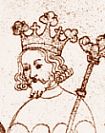


1253 On May 7 Louis IX of France sends Flemish Franciscan missionary William (Gillielmus) (Willem) (Guillaume) of (de) Rubruck (Rubruk) (Ruysbroeck) (Ruysbrock) (Rubriquis) (1220-93) to the court of the Great Khan in C Asia, returning in 1255 with an invitation to submit France to the Mongol power, later reporting his amazing experiences, incl. the source of the Don and Volga Rivers, the location of Lake Balkhash, the cult of the Dalai Lama, the presence of Islam in C Asia, how the Caspian Sea doesn't flow into the Arctic Ocean, Nestorian Christian settlements in China, and the difference between Mongols and Tatars; in May 1254 he engages in a formal debate at the Mongol court with Buddists and Muslims. On July 4 after John I of Avesnes gets his brother-in-law Count William II of Holland to seize Hainaut and the parts of Flanders within the bounds of the empire as overlord, he defeats the armies of Margaret II and Guy of Dampierre at the Battle of West Capelle (Walcheren); Guy of Dampierre is imprisoned, and ransomed in 1256, causing Margaret to agree to sell her rights to Hainaut to Charles of Anjou if he reconquers it from John; too bad, Charles is defeated by Louis IX, and on Nov. 22, 1257 Guy relinquishes Hainaut, only to see John die on Christmas Eve in Valenciennes. On Sept. 23 Bohemian king (since 1230) Wenceslas I Premyslid (b. 1205) dies, and his son Ottokar (Ottocar) (Ottakar) II (the Great) (the Iron and Golden King) (1230-78) becomes king of Bohemia, going on to bring Bohemia to its height of power and wealth, fueled by silver mines, and expanding briefly from Silesia to the Adriatic Sea until the Germans et al. stop him. In Oct. Pope Innocent IV returns to Rome; Russian prince Daniel of Galicia (Volynia_ (1201-64) sells out the Russian Church to him to secure aid for a crusade against the Tartars, but it fizzles. The Mamluks and the Ayyubids sign an agreement granting the Mamluks sovereignty over the kingships W of the Jordan River, and the Ayyubids those E of the Jordan River. Edmund Crouchback, 1st Earl of Lancaster (1245-96), brother of Edward I of England is invested with the kingdom of Sicily and Apulia by Pope Innocent IV, and created earl of Chester by his daddy Henry III; too bad, Conrad IV of Germany is the de facto king f Sicily, and the earldom is soon transferred to his older brother Edward I. The Mongols under Kublai Khan conquer the Thai state of Nan-Chao (Nanzhao) (in modern-day Yunnan and S Szechwan), causing an exodus of Thai (Shan) peoples into Thailand over the next cent. After hearing of a rebellion in Iran led by the Assassins, Hulagu Khan leads an army through Samarkand and Balkh, sieging the Assassin stronghold of Alamut (ends 1256). Henry III of England orders worship in a Jewish synagogue to be held quietly so that Christians like him don't have to hear it?; Jews are forbidden to employ Christian nurses or maids; no Jew may prevent another from converting to Christianity. Theobald IV dies, and Theobald II/V (the Young) (1239-70) becomes count of Champagne and Brie, and king of Navarre (until Dec. 4, 1270). Franciscan friar (St.) Bonaventura (Bonaventure) (Giovanni di Fidanza) (1221-74) becomes a prof. of theology at the U. of Paris, and in 1257 he is elected minister gen. of the Franciscan Order, introducing reforms into the constitutions, and settling the big dispute between the Spirituales and Relaxisti - don't ask if you're underage? HRE Conrad IV founds the town of Aquila degli Abruzzi (L'Aquila) (It. "the Eagle") in C Italy in the Atorno Valley 54 mi. NE of Rome; it becomes an espiscopal see in 1257. Linen is first manufactured in England. In 1253-7 the Sorbonne in Paris is founded by court chaplain (to Louis IX) and Roman Catholic theologian Robert de Sorbon (1201-74) as the Community of Needy Theological Students (La Communaute des Pauvres Maitres Etudiant en Theologie), a residence hall for needy theological students; by the end of the cent. it is called La Sorbonne, becoming part of the U. of Paris, which in 1970 is split into 13 autonomous univs. Architecture: The House of Rosenberg builds the castle of Cesky Krumlov in S Bohemia, dominating it until 1611. Births: Burmese Hanthawaddy king #1 (1287-1307) Wareru (d. 1307) on Mar. 20 in Thaton. Serbian Nemanjic king (1282-1321) Stefan Uros II Milutin (d. 1321); youngest son of Stefan Uros I (-1277). Iranian Safavid Sufi order founder Shaykh Safi al-Din (d. 1334) in Ardabil. Deaths: French king of Cyprus (1218-53) Hugh I (b. 1218) on Jan. 18 in Nicosia. French king (of Navarre) Thibaut IV (b. 1201). Bohemian king (1230-53) Wenceslaus I Premyslid (b. 1205) on Sept. 23. Bavarian duke Otto II (b. 1206) on Nov. 29 in Landshut.



1254 The last Hohenstaufen on the throne of Sicily goes out kicking? On May 21 after being excommunicated, Conrad IV (b. 1228) dies of malaria in Lavello, and his brother Manfred continues the HoHo Hohenhstaufen fight with the PaPa Papacy, seizing the regency of Sicily for Conrad IV's infant son (his nephew) Conradin (1252-68) (until 1258), while Pope Innocent IV confers the crown of Sicily on Edmund Plantagenet, 2nd son of Henry III of England, in return for assuming a papal debt of £90K for this war; after he agrees, papal forces invade Sicily, and Manfred restores the Kingdom of the Two Sicilies to the papacy, while the pope attempts to help Henry III pay his debt obligation by a tax imposed on the English clergy, pissing them off; too bad, on Dec. 7 Pope (since 1243) Innocent IV dies (before or after numerologists discover that his Latin name equals 666 and proclaim him the Antichrist?), and on Dec. 12 Raynold (Rinaldi), Count of Segni is elected Pope (#180) Alexander IV (-1261); the Sicilian thang now being in limbo, the Great Interregnum begins (ends 1273), with non-Germans Richard of Cornwall and Alfonso X of Castile claiming the imperial crown, while the German princes solidify their political independence. On Aug. 8 after leaving Palestine for France, leaving John of Ibelin in charge of Jerusalem, Louis IX of France hears a court case about a chess player who stabbed his opponent to death, causing him to restrict chess to laymen; meanwhile John of Ibein makes peace with Damascus, freeing his forces to attack Ascalon. On Nov. 1 after Henry III worries about a Castilian invasion of Gascony, he marries his 15-y.-o. son Edward I (1239-1307) to 13-y.-o. Eleanor of Castile (1241-90), half-sister of Alfonso X of Castile; Edward I receives lands worth 15K marks/year, incl. land in England (earldom of Chester), Wales, and Ireland, becoming lord of Ireland, going on to use the country to provision his campaigns against the Welsh, French, and Scots; his son Edward II continues the practice. On Nov. 3 after conquering S Thrace and Macedonia from Bulgaria, allowing Michael II of Epirus to help himself to W Macedonia, then defeating him and forcing him to recognize Nicaean suzerainty, Nicaean emperor (since 1221) John III Ducas Vatatzes (b. 1193) dies in Nymphaeum, and his only son Theodore II Ducas Lascaris (Theodore II Doukas Laskaris) (1221-58) succeeds him as Greek emperor #2 of Nicaea (until Aug. 18, 1258). King Louis IX returns to France from the Holy Land, ending the Seventh Crusade (begun 1248), and expels the Jews from France, ending the Tosaphists Period; most go E to Germany or farther; The Bulgarians under Tsar Michael Asen I invade Serbia in support of Dubrovnik, forcing Stefan Uros I to make separate peace agreements; Michael Asen I attempts to reconquer the lost territories in the Balkans from Nicaea, but is badly defeated by Theodore II Lascaris at the Battle of Adrianople (Adrianopolis) on the Tundzha River 130 mi. NW of Constantinople. Bela IV of Hungary regains suzerainty over Bosnia, and establishes it over N Serbia and the principality of Hum (Zahumlje) (Herzegovina). English king Henry III asks the Scots for military aid in Aquitaine, and only Alan Durward responds, going to Burgos in Castile with future Prince Edward and restoring himself in the king's favor while turning him against the Comyns. Henry III summons two knights from each county to join the barons and prelates in the Great Council. Great Khan Mongke tells Flemish Franciscan monk William of Rubruck (1220-1293), envoy of Louis IX of France that religions are like the fingers of one hand - like Lady Five Fingers? Alfonso X the Wise of Castile charters the U. of Salamanca (founded 1217). Hetum I the Great of Lesser Armenia (Cilicia) travels to the court of Buddhist Mongol ruler Mangu Khan in Karakorum to renew their alliance against the Muslims, and presents him with sumptuous presents, then after failing to convert him to Christianity he strikes a deal to work together to take Jerusalem from them. Pope Innocent IV finally excommunicates cruel tyrant Hellzelino, er, Ezzelino III da Romano four years after the death of his protector HRE Frederick II, and launches a crusade against him. The term "Holy Roman Empire" is first used for the Empire of the West or Roman Empire started by Charlemagne in 800 (Holy Empire since 1157). Births: French king of Naples-Sicily and Albania (1285-1309),and Jerusalem, prince of Salerno and Achaea, and count of Anjou, Provence, and Forcalquier Charles II (the Lame) (d. 1309); son of Charles I of Anjou (1226-85) and 1st wife Beatrice of Provence (1231-67); husband of Maria Arpad of Hungary (1257-1323) (daughter of Stephen V); father of Charles I Martel of Anjou (1271-95), Marguerite of Anjou and Maine (1273-1299) (wife of Charles of Valois, son of Philip III), St. Louis of Toulouse (1274-97), Robert the Wise of Anjou (1277-1343), Philip I of Taranto (1278-1331), Raymond Berengar (1279-1307), Blanche of Anjou (1280-1310) (wife of James II of Aragon), Eleanor of Anjou (1289-1341) (wife of Frederick III of Sicily), Peter Tempesta (1291-1315), and John of Gravina (1294-1336); grandfather of Charles I of Hungary (1288-1342) - his 3rd leg wasn't lame? Chinese painter Zhao Mengfu (Chao Meng-fu) (d. 1322). Italian "Book of the Marvels of the World" remarkably polished traveler-trader Marco Polo (the Younger) (d. 1324) on Sept. 15 in Venice; son of Niccolo Polo (1230-94), brother of Marco Polo the Elder and Maffeo Polo (1230-1309), sons of Andrea Polo. Deaths: Greek emperor of Nicaea (1221-54) John III Ducas Vatatzes (b. 1193) on Nov. 3 in Nymphaeum. German king (1237-54) Conrad IV (b. 1228) on May 21 in Lavello (malaria).

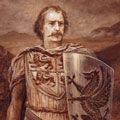
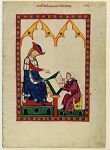
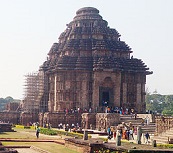
1255 On Mar. 25 Pope Alexander IV excommunicates Manfred, and on Aug. 20 Manfred rebels and defeats papal forces at the Battle of Foggia. In June the Battle of Bryn Derwin sees Llywelyn the Last (Llewelyn ap Gruffudd) (1223-82) defeat his brothers Owain Goch ap Gruffydd and Dafydd ap Gruffudd, becoming the sole ruler of Wales (W of the Conwy River), and the last independent prince of Wales before the stankin' English takeover in 1282, going on to recover much lost Welsh territory in 1257-60 and bring a period of stability until the mid-1270s. In Aug. Alan Durward, backed by the earl of Dunbar stages a coup in Scotland, seizing Edinburgh Castle and causing Alexander III to form a new govt. with the Comyns kicked out, set to expire on the king's 21st birthday in 1262 (ends 1257); meanwhile Henry III sends Richard de Clare, 6th earl of Hertford to Edinburgh to find out what's happening with his son-in-law Alexander III, and to try to bring him back; after pretending to be knights of Robert de Roos, they get into Edinburgh Castle, sneak in their party, and find the queen, who tells them she is being kept apart from the king, and they force Roos to go get the king; meanwhile the Scottish magnates discover the English in the castle, but won't siege it while kingy and queeny are inside, and de Clare is given save passage with the king, and they arrive in Newminster, Northumberland by Sept. 24. Henry III of England accepts Sicily for his son Edmund - now all he has to do is hold it? Ottokar II of Bohemia successfully campaigns against the heathen Prussians in support of the Teutonic Knights. Carintana dalle Carceri of Venice, 2nd wife of William II of Achaea dies, causing the War of the Terciers of Euboea between Venice and Achaea over her inheritance of a fief in Euboea (end 1258). Ewen MacDougall, 3rd Lord of Dunollie and of Lorn (-1266) in Scotland is restored to his lands in the Hebrides, pissing-off the Norwegians, who claim to own them. Brian mac Neill Ruaidh Ua Neill (-1260), king of Tir Eoghain raids the lands of English colonists across the Bann River into Ulaid, destroying towns and castles; in 1256 Connacht king Aodh O'Connor conquers the neighboring kingdom of Breifne with Brian's help; in 1257 Tadhg O'Brien, king of Thomond defeats the colonists and plunders their lands; in 1258 Brian, Aod, and Tadhg form an alliance, meeting near a ruined Geraldine castle in Belleek, County Fermnagh on the Erne River, where Brian is confirmed as high king of Ireland, and Aodh as overlord of Breifna; too bad, Tadhg dies in 1259. English Christian boy Little St. Hugh (b. 1246) is allegedly ritually murdered by the Jews in Lincoln, England, after which the rabbi who allegedly presided over the ceremony is dragged by the tail of a horse through the streets and hanged, and another (the same?) Jew named Copin is executed after allegedly confessing that the Jews do it once a year; despite the intervention of Dominican monks, 18 more are hanged, and 90 are imprisoned in London for further investigation; Henry III transfers his "rights to mastery of the Jews" to his brother Richard for 5K marks. Lisbon becomes the new capital of Portugal. Erfurt, Germany is granted municipal rights. Architecture: The Bargello (Ger. "burg" = castle) (Palazzo del Popolo) (originally the Palazzo del Podesta) next to the Volognana Tower in Florence, Italy is begun to house the podesta (pres. of the city council), becoming the oldest public bldg. in Florence, serving as a model for the Palazzo Vecchio (1299); in 1574 the Medici turn it into a prison and HQ of the police chief, with executions abolished in 1786 by Grand Duke Peter Leopold; in 1856 it becomes a nat. museum, housing Gothic and Renaissance sculptures from the 14th-17th cents., incl. masterpieces by Michelangelo, Donatello, Vincenzo Gemito, Jacopo Sansovino, Benvenuto Cellini, Gianlorenzo Bernini, Antonio del Pollaiolo et al. About this year the Konark (Sansk. "kona" + "ark" = corner + the Sun) Sun Temple at the mouth of the Chandrabhaga River in Orissa, India (21 mi. from Puri) is built by King Narasimhadeva I of the Eastern Ganga Dynasty, shaped like a giant chariot complete with 12 pairs of stone wheels and dedicated to the Sun God Surya; Euro sailors call it the Black Pagoda. Sports: On May 8 the provincial council of Beziers, France forbids the playing of the pesky game of chess. Poetry: Ulrich von Lichtenstein (1200-78), Frauendienst (Service of His Lady); about two jousting tours he made, one dressed as Frau Venus and the other as King Arthur - the original Johnny Cash and June Carter? Konrad von Wurzburg (1225-87), Herzmaere; Der Schwanritter; adopted by Richard Wagner for the libretto of his opera "Lohengrin". Births: French poet Guido Cavalcanti (d. 1300); friend of Dante Alighieri. French Dominican monk and scholastic theologian John (the Blind) (Quidort) (Surdus) (Monoculus) of Paris (Jean de Paris) (d. 1306) in Paris. Austrian Hapsburg HRE (1298-1308) Albert (Albrecht) I of Hapsburg (d. 1308) in July in Rheinfelden; eldest son of HRE Rudolf I of Hapsburg (1218-91) and 1st wife Gertrude of Hohenburg (1225-81). Italian painter Duccio di Buoninsegna (d. 1319) in Siena, Tuscany; founder of the Sienese School of Painting (which absorbs Byzantine art), and #2 Italian artist of late medieval Italy after Giotto. French political writer Pierre Dubois (d. 1322) in Normandy; educated at the U. of Paris. Deaths: Italian "Dies Irae" Franciscan friar-poet Thomas of Celano (b. 1200). Malian emperor #1 Sundiata Keita (b. 1217); drowns while crossing the Sankarini River.

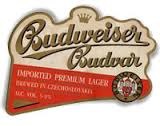
1256 On Jan. 28 William of Holland (b. 1228) dies, and Pope Alexander IV supports Richard of Cornwall for king of Germany against Alfonso X of Castile; too bad, the English people grow bitter over the costs? In May Narathihapate (1238-87) becomes king of Pagan (Bagan) in N Burma (until 1287), going on to get his butt kicked by the Mongols. In June Pope Innocent IV gets Ezzelino III da Romano kicked out of Padua, pissing him off and causing him to slaughter 11K Paduans on the Plain of Verona (Campi di Verona). In Dec./Jan. Kaliman (Koloman) Asen II (-1257) murders his first cousin Michael Asen I (b. 1239) during a hunting party near Tarnovo and usurps the throne with the support of the boyars, being crowned Bulgarian tsar, marrying Michael's widow, but her pissed-off daddy Rostislav Mihailovich (1225-62) advances on him from Belgrade and chases him out of Tarnovo, after which he is murdered next year; Rostislav returns home with his daughter and tries to claim the throne for himself, but Michael's brother-in-law Mitso (Micho) Asen (-1278) takes the throne (until 1257), and is then deposed and expelled. In Nov. after Henry III gives his son Prince Edward Longshanks the area in Wales between the Dee and Conway Rivers known as Y Berfeddwlad (Perfeddwlad), and he visits it during the summer, only pissing them off worse, Llywelyn the Last invades and recovers all of it except the English castles of Dyserth and Deganwy, then by 1258 takes over all of Wales, styling himself prince of Wales in 1257, which gives Longshanks ideas as a nice title for his son? The Swedes attempt to block the Russians from the Baltic Sea. Pissed-off at losing Ascalon, the Mamluks siege Jaffa, but John of Ibelin returns from Ascalon and defeats them, giving up control of Jerusalem to his cousin John of Arsuf (Ibelin) (1211-58). The Venetian-Genoese (Hundred Years) War between the maritime repubs. of Venice and Genoa begins when the Venetians are evicted from Tyre, and try to move into Acre onto land owned by the Monastery of St. Sabas, which Genoa claims, starting the War of St. Sabas (Saba) (ends 1270) in Acre, with John of Ibelin, count of Jaffa, and the Knights Templar supporting the Venetians, and Philip of Monfort, John of Arsuf, and the Knights Hospitaler supporting the Genoese, who win early Vs until the repub. of Pisa signs a 10-year military alliance with Venice. After a 3-year siege, Hulagu Khan's Mongol troops destroy the Assassins' fortress stronghold of Alamut (built 1090) and massacre them; the sect disperses but retains a presence until modern times; Hulagu accuses last Abbasid caliph (since Dec. 5, 1242) Al-Mustasim Billah (1213-58) (a learned calligrapher) of sheltering the rebels, and demands his submission along with the demilitarization of Baghdad, which is refused. Fighting flares up between the Valencia rebels and the Aragonese. Parakramabahu II repels another attack (first 1236) by Tambralinga on the Straits of Malacca, again with Pandya help. The Wendish towns of Lubeck, Stralsund, Wismar, Rostock, and Greifswald hold their first Hanseatic League meeting; Luneburg later joins; the 1226 Code of Lubeck is agreed to by most of them, making them independent of royalty. Thomas Aquinas receives his doctorate in theology, and is appointed prof. of philosophy at the U. of Paris. Kublai Khan builds the city of Xanadu (Shangdu) (Chin. "Upper Capital") (original name Kaiping until 1264) in modern-day Inner Mongolia 220 mi. N of Peking, reaching 100K pop.; in 2002 a restoration effort begins; Marco Polo visits about 1275. The town of Ceske Budejovice in S Bohemia at the conjunction of the Vltava and Maise Rivers is founded by Bohemian Przemyslid king (1253-78) Ottokar II "the Iron and Golden King" (1233-78), who grants it brewing rights, causing the founding of the Svitavy Brewery (closed in 2002), after which the town gains fame for its great Budweiser beer, produced by Budweiser Budvar Brewery (founded in 1785). Science: Arab Muslim physician Khalifah ibn-abi'l-Mahasin of Aleppo performs a cataract operation on a 1-eyed man, leaving a comprehensive ocular manual. Nonfiction: Thomas Aquinas (1225-74), Commentaries on the Sentences of Peter Lombard. Births: Spanish military hero (born a Muslim?) Alonzo Perez de Guzman (El Bueno) of Aragon (d. 1309) in Lim (Morocco?); founder of the Medina Sidonia family. French House of Bourbon founder Count (1268-1317) Roger of Claremont (d. 1317); son of Louis IX (1214-70) and Margaret of Provence (1221-95). Deaths: Japanese shogun #4 (1226-44) Kujo Yoritsune (b. 1218) on Sept. 1. German king (1247-56) William II of Holland (b. 1228) on Jan. 28. Bulgarian tsar (1246-56) Michael I/II Asen (b. 1239) in Dec./Jan. near Tarnovo (murdered).
1257 A volcanic eruption in Mt. Samalas on Lombok Island near Bali, Indonesia destroys the capital city of Pamatan and shoots 2.4 cu. mi. of rocks and ash, incl. the most sulfur into the atmosphere in 7K years. Pogroms almost wipe out Jewish communities in Cambridge, Canterbury, Lincoln, London, Northampton, Winchester, and Worcester in England. In May the Battle of Cadfan (Gael. "battle place") sees the Welsh under Llywelyn ap Gruffydd of Gwynedd defeat the stankin' English under Prince Edward Longshanks. In Oct. the Comyns stage a coup in Scotland and kidnap Alexander III during the night in Kinross; by now the king is old enough to stand up to them and won't form a new govt. The Mongols attempt to surround the Chinese from the S by invading N Vietnam, but are expelled by next year. Richard of Cornwall is elected king of the Romans and crowned at Aix-la-Chappele; he is soon unelected. Julian of Grenier, lord of Sidon donates the Cave of Tyron to the Teutonic Knights, who also buy a large land complex called Souf (Schuf) near Sidon. After he tries to take over, Mamluk ruler Shagarat ad-Durr has her hubby Aybak murdered in his bath, and next year former Turkish slave Al-Malik Baibars(-1223-77) becomes Mamluk ruler #2 (until 1177), going on to murder Sultan Qutuz in 1260 and become the first Mamluk sultan, kicking Crusader butt, building up the military, and organizing the govt. to prevent incompetence, which holds until 1517. Science-loving Roger Bacon becomes a Franciscan, which gets him into trouble for the rest of his life? The Muslims use some form of incendiary weapon in the Battle of Niebla. Chinese silk becomes available in Europe. Premysl Otakar II founds Prague's Lesser Town (Mala Strana) on the left bank of the Vlatava River, and invites colonists from N Germany. Poetry: Ulrich von Lichtenstein (1200-78), Frauenbuch; laments the decay of chivalric courtship. Sadi (1184-1291), The Fruit (Rose) Garden (Gulistan); Persian boys should eat fruit from the garden of life? Births: English Norman chronicler and Dominican friar Nicholas Trivet (Trevet) (Nicolas Trivetus) (d. 1334) in Somerset. Deaths: Dutch count of Hainaut (1246-57) John I of Avensnes (b. 1218) on Dec. 4 in Valenciennes. Bulgarian tsar Michael Asen (b. 1240).


1258 In Jan.-May a large volcanic eruption occurs in Mexico or Ecuador, shooting 190-270 megatonnes into the air (8x larger than Krakatoa in 1883), causing a severe winter and famine in England, W Germany, France, and N Italy, pestilence in London, France, Austria, Iraq, Syria, and SE Turkey, lunar eclipses in England, a dry fog in France, a harsh spring in N Iceland et al. On Feb. 13 after stupid last Abbasid caliph Al-Mustasim (a damn fine calligrapher) fails to raise an army to defend it (thinking that women throwing stones can fight them off?), and accepts an offer of surrender with clemency from Hulagu Khan after a 1-mo. siege, Baghdad, the Paris of the Orient is captured by the Mongol hordes of Genghis (Chinggis) ("universal river") Khan (1162-1227) (birth name Temujin = "iron worker") under the leadership of his grandson "Go West, Young Man" Hulagu Khan (1217-65); of course he reneges, and 800K-1M are slaughtered over 40 days, the Tigris River running black with the ink from hundreds of thousands of ruined books; on Feb. 20 after being forced to reveal the hiding place of his royal treasure, Al-Mustasim is rolled in a rug and trampled with horses so that no Mongol could be accused of shedding royal blood (either that, or he is imprisoned with his royal treasure and starved to death to mock him for not spending it on defense, with the khan telling him "Eat of your treasure as much as you want, you are so fond of it"), becoming the last Abbassid caliph of Baghdad; the Abbasid Dynasty (founded in 750) comes to an end along with Islam's Golden Age; the destruction of the irrigation system turns the paradise alley into a barren arid plain; the citadel of Arbil on the Great Zab River is captured; the town of Tehran (Pers. "warm place") (modern pop. 8M) in Persia is settled by refugees from the Mongol invasion; Hulagu Khan goes on to take Iraq, followed by Anatolia. In Apr. a Scottish parliament summoned by Alexander III meets in Stirling to form a new govt., and by Sept. unity is restored with the Comyns dominant. On May 11 the 1258 Treaty of Corbeil settles the claims between Louis IX of France and James I of Aragon to France's advantage, relinquishing all French claims to Barcelona and Roussillon in return for part of Provence and Languedoc, with both sides giving up the idea of cross-Pyrenees kingdoms; Louis IX's son Philip is betrothed to Isabella of Aragon. In June after English king Henry III asks the Great Council for help in paying off his debt for the Sicilian war, his pissed-off barons, led by Simon (V) of Montfort, 6th Earl of Leicester (1208-65) step in, drafting a program of reforms Provisions of Oxford; after marching to the king's hall and forcing him to agree, a new baronial council of 15 takes the place of the Great Council, and they are placed under a new committee of 12 barons, becoming the First English Rev., and Montfort the "Father of the English Parliament"; Henry III swears to them, but weasels out by 1261, and the council only lasts 15 mo.; the Parliament (House of Commons) (the first one becoming known as the Oxford or Mad Parliament) is established, with Peter de Montfort as first parlour (speaker), and Simon de Montfort running both it and the country, ending absolute monarchy; it convenes for 18 mo. until Simon de Montfort's death at the 1264 Battle of Evesham. In June after an unusually mild winter in 1249 where flowers sprout in Jan. before turning cold in Apr.-May, the summer in England is unusually wet and cool, leading to crop failures and famine in winter, killing 20K in London, with people driven to eating tree bark. On Aug. 18 Theodore II Lascaris (b. 1221) dies, and his 7-y.-o. son John IV Ducas Lascaris (John IV Doukas Laskarus) (1250-1305) becomes emperor #3 of Nicaea (until Dec. 25, 1261), with Michael Palaeologus as regent. On Sept. 27 Pope Alexander IV issues the bull Quod super nonnullis, giving authorities the right to enslave and confiscate the land of non-Christian peoples who refuse to submit to baptism, requiring cases of alleged witchcraft to be investigated by local authorities not Church inquisitors unless they "clearly savored of manifest heresy". The Venetians under adm. Lorenzo Tiepolo break through the harbor chain in Acre and defeat the Genoese navy, capturing the disputed St. Saba monastery, then after the 800 Genoese soldiers and crossbowmen hold their quarter of the town, Tiepolo begins a blockade, after which in Aug. John of Arsuf, hoping to aid Genoa signs a treaty with the city of Ancona granting commercial rights in Acre, but it backfires when John of Ibelin and John II of Beirut turn them to Venice's side, leaving only Philip of Monfort on the Genoese side, but after his 380 men are defeated, on Oct. 16 a peace treaty is signed by the Templars, Hospitallers, and Teutonic Knights, and the tired Genoese leave their acre in Acre for Tyre, continuing the fight. Manfred (illegitimate son of Frederick II) causes a rumor that Conrad IV's son Conradin is dead, allowing himself to be crowned king of Sicily in Palermo, after which Pope Alexander IV excommunicates him and offers the crown to Charles I of Anjou. King James takes al-Azraq's main citadel and suppresses the Valencian rebellion. William II of Achaea defeats the duke of Athens, ending the War of the Terciers of Euboea (begun 1255) with a V. Gallowglasses ("foreign soldier") (mercenaries) come to Ulster from Scotland to work for Irish chieftains. Henry III issues a royal proclamation in English this year, rather than the usual French. Bologna, Italy joins the club and passes the death penalty for homosexuals, burning at the stake, or perpetual banishment, their choice? - no more hot dog jokes? The town of Wolverhampton, England begins holding a Wednesday market and annual fair. Births: Spanish king of Castile and Leon (1284-95) Sancho IV the Brave (d. 1295) on May 12 in Valladolid; 2nd son of Alfonso X (1221-84) and Yolanda (Violant) of Aragon (1236-1301) (daughter of James I of Aragon); elder brother of Ferdinand de la Cerda (1253-75). Italian anatomist Mondino de Luizzi (d. 1326) in Bologna. Turkish Seljuk bey (1280-) and Ottoman sultan #1 (1299-1326) Osman (Osmanli) (Othman) I Gazi ben Ertugrul (Kara) (the Black) (El-Bazi) (d. 1326) in Sogut, Anatolia; son of Ertugrul (-1280), leader of the Turkic Kayi tribe, who fled from the Mongols W from C Asia to W Anatolia, and Halime; father of Orhan I (1284-1359). Deaths: Portugese count of Urgell (1229-31) Peter I (b. 1187) on June 2 in the Balearic Islands; dies without an heir, causing his Balearic possessions to revert to the crown of Aragon, becoming the kingdom of Majorca. Byzantine emperor Theodore II Lascaris (b. 1221) on Aug. 18 in Magnesia (epilepsy).
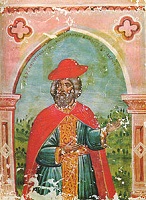



1259 On May 29 Christopher I (b. 1219) dies (poisoned?) after being excommunicated and taking Communion, becoming known as "Christ's sacrifice", and his son Eric V Klipping (Clipped Penny) (1249-86) becomes king of Denmark (until 1286), with his mother Margaret Sambiria (Sambirsdatter) (Spraenghest) (1230-82) as regent as regent during his minority. Michael VIII Palaeologus (Palaiologos) (1223-82) becomes co-emperor of Nicaea (until Dec. 11, 1282), and defends the empire against a coalition of Michael II of Epirus, Manfred of Sicily, and William II of Achaea (after he marries Anna Komnene Doukaina, daughter of Michael II of Epirus), while working for the big enchilada of getting Constantinople back into Greek Orthodox hands; in Sept. William II attacks the Nicaeans at the Battle of Pelagonia, but is defeated after his Epirote army deserts, and after hiding under a haystack he is captured and held in captivity in Nicaea until 1262. On Oct. 7 mean excommunicated Vicenza podesta (since 1236) Ezzelino III da Romano (b. 1194) dies after being wounded by an arrow in the Battle of Cassano d'Adda, then being captured near Bergamo; Padua begins a period of peace and prosperity; the great council of Verona elects Mastino I della Scala (-1277) as their new podesta, founding the Scaliger Lords of Verona - where's Romeo and Juliet? On Dec. 4 the Treaty of Paris between France and England yields Perigord and the Limousin in S France to Henry III of England, despite protests from both provinces, in return for renunciation of English claims to Normandy, Maine, Touraine, and Anjou; Guienne becomes distinct from Aquitaine; Navarre is cut off from the sea; despite the peaceful intentions of Louis IX, public opinion goes against him, weakening his position in S France. Mamluk ruler (since 1249) Shagarat ad-Durr is battered to death with wooden shoes by her murdered hubby's women slaves. 15-y.-o. (since 1246) Go-Fukakusa (b. 1243) abdicates at the insistence of his retired Go-Saga, and his 10-y.-o. brother Kameyama (1249-1305) (7th son of Go-Saga) becomes Japanese Yamato emperor #90 (until 1274). The Provisions of Westminster are enacted by the Great Council, remedying various govt. abuses in England, but the new baronial govt. soon starts to groan under selfish barons, despite good barons such as Simon de Montfort. Prince Llywelyn establishes peace between England and Wales. The Novgorod Uprising by the boyars is crushed by Alexander Nevsky. The Lower Saxon town of Hameln (of Pied Piper fame) (a member of the Hanseatic League) is sold to the bishop of Minden, but the townsfolk go nonlinear and place themselves under the protection of the duchy of Brunswick after a violent battle. Kublai Khan sieges the city of Wuhan, but news of the death of Great Khan Mongke forces him to withdraw to Karakorum. Ganapati dies, and his daughter Lady Ganapati (-1288) becomes ruler of Kakati in E India, going on to meet Marco Polo. Pope Alexander IV summons U. of Paris brain man Thomas Aquinas to Rome (until 1268), where he wows everybody with his erudition. Births: Turkish sultan (founder of the Ottoman Empire) Osman (Othman) (Ottoman) (Ataman) I Gazi ben Ertugrul (d. 1326) in Sogut, Anatolia. Italian painter (in Rome) Pietro Cavallini (d. 1330). Byzantine emperor (1282-1328) Andronicus (Andronikos) II Palaeologus (Palaiologos) (d. 1332) on Mar. 25 in Constantinople; son of Michael VIII (1223-82) and Theodora Doukaina Vatatzina. Deaths: Italian condottiero Ezzelino III da Romano (b. 1194) on Oct. 7 near Bergamo; Dante consigns him to the Seventh Circle of Hell, First Ring (Violent Against Neighbors). English chronicler-monk Matthew Paris (b. 1200). Mongol Great Khan (1251-9) Mongke (b. 1208). Danish king (1252-9) Christopher I (b. 1219) on May 29.